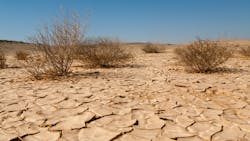Climate change to bring enhanced droughts worldwide
New research from the University of East Anglia (UEA) finds that rising global temperatures will bring significant risks of more frequent and longer-lasting droughts for India, China, Ethiopia, Ghana, Brazil, and Egypt.
The study, published in the journal Climate Change, shows that even a modest increase of 1.5°C could bring major enhancements to droughts in the six countries. The study had chosen those countries for their variance in size, development, and biome composition.
The paper estimated the impacts that different degrees of global warming — between 1.5°C and 4.0°C — would have on the probability and length of severe drought.
“Current pledges for climate change mitigation, which are projected to still result in global warming levels of 3 °C or more, would impact all the countries in this study,” says Jeff Price, a UEA associate professor of biodiversity and climate change. “For example, with 3 °C warming, more than 50 per cent of the agricultural area in each country is projected to be exposed to severe droughts lasting longer than one year in a 30-year period.”
“Using standard population projections, it is estimated that 80 per cent to 100 per cent of the population in Brazil, China, Egypt, Ethiopia and Ghana (and nearly 50 per cent of the population of India) are projected to be exposed to a severe drought lasting one year or longer in a 30-year period,” continues Price. “In contrast, we find that meeting the long-term temperature goal of the Paris Agreement, that is limiting warming to 1.5 °C above pre-industrial levels, is projected to greatly benefit all of the countries in this study, greatly reducing exposure to severe drought for large percentages of the population and in all major land cover classes, with Egypt potentially benefiting the most.”
The general estimates for the study’s scenarios are as follows:
- With 1.5 °C warming, drought probability is projected to triple in Brazil and China, nearly double in Ethiopia and Ghana, increase slightly in India, and substantially increase in Egypt.
- With 2 °C warming, the probability of drought is projected to quadruple in Brazil and China; double in Ethiopia and Ghana; reach greater than 90 per cent probability in Egypt; and nearly double in India.
- With 3 °C warming, the probability of drought projected to be in Brazil and China is 30-40 percent; 20-23 percent in Ethiopia and Ghana; 14 percent in India but nearly 100 percent in Egypt.
- With 4 °C warming, the probability of drought projected in Brazil and China is nearly 50 percent; 27-30 percent in Ethiopia and Ghana; nearly 20 percent in India; and 100 percent in Egypt.
In most countries, the projected increase in drought probability increases almost linearly with increasing temperature. The exception is Egypt, where even slight amounts of global warming could lead to large increases in drought probability.
“Not only does the area exposed to drought increase with global warming, but it also increases the length of the droughts,” says Rachel Warren, leader of the overall study of which this paper is one output. “In Brazil, China, Ethiopia, and Ghana droughts of longer than two years are projected to occur even in a 1.5 °C warming scenario.”
